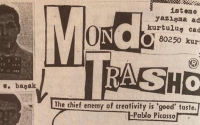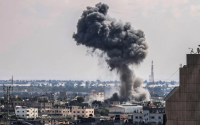5 February 2007Tom Engelhardt
Afghanistan remains the forgotten war and yet, in an eerie lockstep with Iraq, it seems to be following a distinctly Bush administration-style path toward "the gates of hell." While almost all attention in Washington and the U.S. media has been focused on the President's new "surge" plan in Iraq -- is it for 21,000 or 50,000 American troops? Just how astronomical will the bills be? Just how strong will Congressional opposition prove? Just how bad, according to American intelligence, is the situation? -- Afghanistan is experiencing its own quiet surge plan: more U.S. (and NATO) troops, more military aid, more reconstruction funds, more fighting, more casualties, heavier weaponry, more air power, more bad news, and predictions of worse to come.
The repetitive and dismal headlines, often tucked away in back pages, tell the tale:
On the fighting:
"Airstrike kills up to Seven in Afghanistan"
"12 militants killed in West Afghanistan"
"Nato offensive 'kills 30 Taleban'"
"Group: Over 1,000 Afghan civilians killed" ("More than 1,000 civilians were killed in Afghanistan in 2006, most of them as a result of attacks by the Taliban and other anti-government forces in the country's unstable south, a rights group said Tuesday...")
"Driving the Taleban off Nipple Hill -- again"
"No foreseeable end to assaults facing Royal Marines in Helmand" ("Another day, another attack. Yesterday the barrage of mortars, rockets and rifle fire began raining down on the British base at Kajaki at just after six in the morning...")
"Taleban forces retake town" ("Taleban forces in southern Afghanistan have taken control of a town which British troops had pulled out of after a peace deal with local elders...")
On calls for intensification of the military struggle:
"Britain to increase forces in Afghanistan"
"NATO to step up efforts to control Afghan border: general"
"U.S. lawmakers, back from Afghanistan, say more NATO troops needed"
On the repetitively dismal tale of "reconstructing" Afghanistan and on drugs:
"Afghan rebuilding hit by 'violence and waste'" ("The international body established to co-ordinate Afghanistan's reconstruction effort marked its one-year anniversary on Wednesday by admitting it was struggling to make progress in the face of rising violence, waste and poor administration.")
"AFGHANISTAN: Girls and women traded for opium debts" ("On 4 November 2006, Nasima, 25, a member of a local women's council, grabbed the AK-47 from the policeman guarding the council meeting in the Grishk district of southern Helmand province and killed herself. She had had enough of the daily beatings by her husband. Like many other women in Helmand, Nasima was given away by her family in 2005. Her father owed a huge amount to an opium dealer...")
On predictions of more and worse to come (with faint hopes of better sooner or later):
"New U.S. commander in Afghanistan expects rise in suicide attacks in 2007" ("The incoming commander of U.S. troops in Afghanistan said Monday he expects Taliban militants to launch more suicide attacks this year than in 2006, when militants set off a record 139 such bombings...")
"NATO general expects offensive, says Taliban beaten" ("The Taliban will launch an offensive within months once the snows melt, but they are effectively a beaten force, according to the outgoing head of NATO forces in Afghanistan...")
So goes the repetitive, if ever deepening, tragedy of our other war -- and under such headlines lie massive tragedies that seldom make the headlines anywhere. Ann Jones, who has spent much time as a humanitarian aid worker in Afghanistan these last years and wrote a moving book, Kabul in Winter, on her experiences, turns to one of those tragedies: the fate of Afghan women.
[This article first appeared on Tomdispatch.com, a weblog of the Nation Institute, which offers a steady flow of alternate sources, news, and opinion from Tom Engelhardt, long time editor in publishing, co-founder of the American Empire Project and author of The End of Victory Culture, a history of American triumphalism in the Cold War, a novel, The Last Days of Publishing, and Mission Unaccomplished (Nation Books), the first collection of Tomdispatch interviews.]
http://www.zmag.org/content/showarticle.cfm?SectionID=49&ItemID=12044






